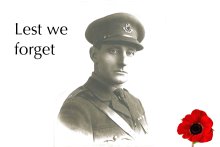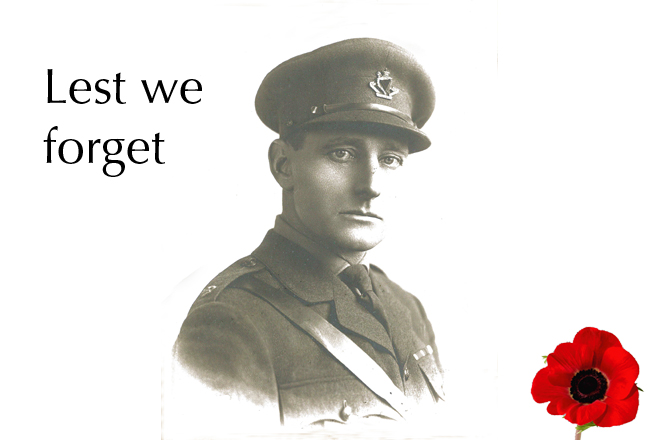OM's Magnificent bravery as the country marks 100 years since the end of WW1

In 1998 John Langford OM and Roland Symons (Hon Archivist) wrote an article that appeared in the OM Gazette about Lt. Col. Richard Annesley West, V.C., DSO and Bar, M.C. (O.M. 1895). As the 100th anniversary of the end of World War One approaches we thought it would be appropriate to republish it and honour all OMs who have made the ultimate sacrifice.
"THE MAGNIFICENT BRAVERY OF THIS VERY GALLANT OFFICER"
Lt. Col. Richard Annesley West, V.C., DSO and Bar, M.C. (OM 1895)
1998 marks not only the 80th anniversary of the Armistice which ended the 1st World War in 1918, but also the 80th anniversary of the award of the only Victoria Cross to be won by an Old Monktonian. OMs of the Centenary vintage may remember this article by John Langford (60) which appeared in the Gazette of November 1968.
Richard Annesley West was born in Cheltenham in 1878. He was the youngest of seven children to a retired army officer who owned an estate near Enniskillen in Co. Fermanagh. Richard West followed two of his three older brothers to Monkton at the late age of sixteen. In 1898, three years after leaving Monkton, he was at an agricultural college at Uckfield. In 1900 he joined the Imperial Yeomanry and embarked for South Africa to fight in the Boer War. In 1901, he was promoted Lieutenant and for his services in the South African War, was awarded the Queen's Medal with seven clasps and the King's medal.
West stayed on in South Africa when the War ended managing a racing stables and getting married. In 1912 he returned to Ireland running a hunting and polo stables. On the day the 1st World War started, West was playing polo in Phoenix Park, Dublin. A week later he was a Lieutenant in the North Irish Horse and on August 20th embarked for France. The Regiment entrained for the front at St Quentin, camping in the town's abattoir! He was immediately caught up in the British Army's retreat from Mons. He had begun keeping a diary and on the 26th August he wrote, "British and French troops retreating through the town. Many frightened women about. Germans advancing rapidly. Saddled up 7pm & stood by, patrols came in with tales of very heavy casualties." It was on September 1st that he had his first taste of action; "Come into action near Crepy; firing all along our right. Found six wounded Germans -Uhlans, four mortally wounded; took one prisoner, shot through arm. Rode into two Uhlans. Opened on them with revolver. They galloped past us firing with automatic pistols; hit my horse twice. Galloped otter them and shot officer in thigh and killed his horse. Took both prisoners. Good day's work".
For his services during those desperate days, West was mentioned in Sir John French's first Despatches of the War.
By July 1916 West was a temporary Major with the North Somerset Yeomanry. His diary entry for 1st July reads, "Brigade stood to. 7.30 am attack commenced. Standing to on lines all day Frequent communiques coming in during the day, doing well in the south and badly in the north". Such were his impressions on that day of perfect summer sunshine when the men of Kitchener's 'New Armies' began the great Somme Offensive.
It was while with the North Somerset Yeomanry that West won the DSO during the fighting for Vimy Ridge during the bitterly cold Spring of 1917. The citation reads; "On 11th April, his squadron was sent forward to reinforce the right flank of the Brigade under very heavy shell and machine-gun fire. By his excellent example, rapid grasp of the situation and skilful disposition of his squadron, he did much to avert on impending German counter-attack" He had shown great ability in command of a squadron since July 1915.
However by this time, Major West was 'browned off' with trench warfare. Just before Christmas 1917, he transferred from the Yeomanry to the recently formed Tank Corps. The next six months were largely spent training in the use of this new weapon. He was posted to the 6th Tank Battalion when it was decided to arm it with Whippets, new light tanks, capable of nearly 8 mph, and designed to exploit breaches in the enemy lines made by heavy tanks and infantry. He was given command of 'C' Company
Spring 1918 saw a tremendous German Offensive, but this had petered out and in July, the 6th Tank battalion was moved forward near Amiens in readiness to take part in the great counter-offensive. On July 9th Major West returned to England for home leave. He managed to get across to Ireland for a few days. On July 25th, he wrote in his diary, "Buckingham Palace Investiture. Went to get DSO from the King." The following day he went back to France.
The Battle of Amiens opened on August 8th. The German Commander, Ludendorff described it as "the black day of the German Army". West's conduct on that day earned him a Military Cross, the citation for which read; "During the advance of August 8 in command of a company of Light Tonks, he displayed magnificent leadership and personal bravery He was able to point out many targets to his Tonks that they would not otherwise have seen. During the day he had two horses shot under him, while he and his orderly between them killed five of the enemy and took seven prisoners. On the 10th he rendered great services to the Cavalry by personally reconnoitring the ground in front of Le Quesnoy, and later in the day, under heavy machine-gun fire, rallied and organised the crews of Tanks that had been ditched, withdrawing them after dark"
Within 11 days, West had won a bar to his DSO; "For conspicuous gallantry near Courcelles on 21st August. In consequence of this action being fought in thick mist, this officer decided to accompany the attack to assist in maintaining direction and cohesion. This he did mounted, until his horse was shot under him, then on foot until the final objective was reached. During the advance, in addition to directing his Tonks, he rallied and led forward small bodies of Infantry lost in the mist, showing throughout a fine example of leadership and a total disregard of personal safety, and materially contributed to the success of the operations. Major West was in command of the Battalion most of the time, his Commanding Officer having been killed early in the action."
Then on September 2nd came his final accolade as recorded in the London Gazette; "It was intended that a battalion of light tanks under Col. West's command should exploit the initial infantry and heavy tank attack near Vaulx-Vraucourt. He therefore rode forward on horseback to our front infantry line in order to keep in touch with the progress of the battle . .. The infantry battalion had suffered heavy officer casualties, and its flanks were exposed. Realising that there was a danger of the battalion giving way, he at once rode out in front of them under extremely heavy machine-gun and rifle fire and rallied the men. In spite of the fact that the enemy were close upon him, he took charge of the situation and detailed NCO's to replace the officer casualties. He then rode up and down in front of them in face of certain death, encouraging the men . .. He fell riddled with machine-gun bullets. The magnificent bravery of this very gallant officer at the critical moment inspired the infantry to redoubled efforts and undoubtedly saved the situation. The hostile attack was defeated."
Such was the citation for the posthumous Victoria Cross awarded to Lt. Col. West.
Colonel West was buried, not where he fell alongside the infantry whom he inspired, but three miles away at Mory among other members of the Tank Corps. But it is the harp badge of the North Irish Horse rather than that of the Tank Corps which is carved on his headstone. However, what makes this headstone stand out from more than 600 around it, is the motif of the Victoria Cross. Under it are the words "Greater love hath no man than this, that a man lay down his life for his friends".
Edited by Roland Symons (Hon Archivist)
from the original article by John Langford (60)




















